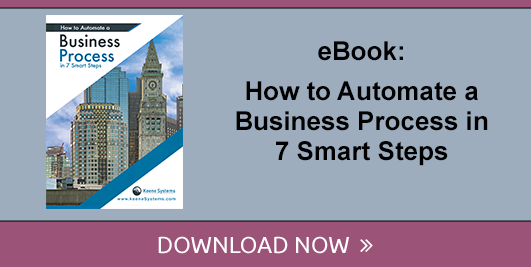Eliminate Human Error in Your Operations Management
2 min read
Topic:
Automate Business Process
Most people think that the IT issue that is preventing them from working is the result of failed technology. They jump to all kinds of conclusions: “It must be a bug in the software!” “It’s a systems failure!” “I wonder if someone hacked into the network?” Any one of these things could be the problem, but in most cases the problem can be traced back to human error. One wrong keystroke can have a disastrous impact on your business systems and processes.
Well known examples of human errors
The 2018 Deloitte Commercial Real Estate Outlook showed that humans were responsible for errors in the accounting and tax industry including deletion of spreadsheet formulas, incorrect manual calculations and multiple sources of data input.
In 2010 traders and investors learned a costly lesson when someone entered a “B” (Billion) instead of an “M” (Million) in a sell order. What seems like a small mistake triggered a chain of events that became known as “the flash crash”. That single error cost investors $1.1 trillion dollars.
In another spreadsheet disaster, JP Morgan discovered the danger of relying on spreadsheets and human accuracy. According to Tim Worstall, a technology contributor at Forbes, JP Morgan’s Chief Investment Office assigned a developer to create a new value-at-risk (VaR) model for the synthetic credit portfolio. The developer, “a quantitative expert, mathematician and model developer”, created a model that operated using a series of spreadsheets. Each spreadsheet was created manually by copying and pasting the data from one spreadsheet to another. An internal review identified this as an issue but approved the model anyway with a recommendation to automate the process and fix other “significant flaws”. Those recommendations were ignored. Consequently, an error in one of the equations was not found and fixed resulting in a loss of several billion dollars.
The impact of human errors in business
While a human error might not cost your business billions or trillions of dollars the effect can be just as disastrous when it affects business growth or customer satisfaction. Businesses use spreadsheets for several business-critical tasks including accounting, time-tracking, resource allocation, schedules and logistics.
In an experiment testing the probability of an error in the performance of spreadsheet tasks, Ray Panko, from the College of Business Administration at the University of Hawaii, found that individuals working alone had an 86% error rate. While the percentage is much lower for those working in groups - 27% - the number matters little when it affects your bottom line. When each error has the potential to cost your business money it makes sense to take measures that remove or decrease the chances of errors.
Several things can affect an employee’s job performance. Perhaps, they had a late night for some reason and they are tired. Sometimes an employee is simply trying to do too much. They might be answering calls while they are inputting data. Maybe, someone called in sick. Now the rest of the team is scrambling to get their work and the absent co-workers work done. Whether they are tired or overtasked the result is the same – the likelihood they will make a mistake increases.
Dependence on spreadsheets and the resulting human errors waste time and money. The business systems and processes you choose to use should save you time and money while also maximizing employee efficiency and profitability.
How do you eliminate human error in business operations?
The development and use of custom software that is designed specifically for your business’ operations and activities takes most of the opportunity for human error out of the equation. It also cuts down on disruptions in business operations and the time IT must spend searching for errors.
The profitability and efficiency of business operations depends on accuracy. It just makes sense to use customized software made for your unique business operations and processes.
To learn more about the importance of eliminating human error in your operations, please download the eBook titled "How to Automate Business Process in 7 Smart Steps."


